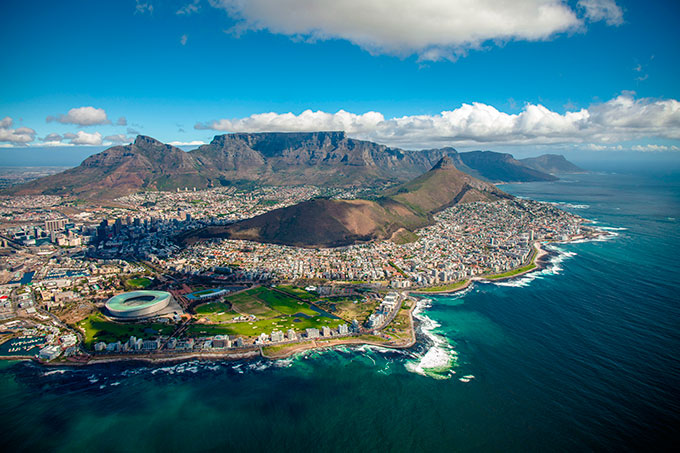A news item regarding the shortage of water in Cape Town recently circulated through periodicals all over the world and caused a shock, and not just to those who will be impacted directly. A limit to the supply of drinking water that will begin no later last than April 22 is the unqualified order from city officials, with the possibility that rationing will be pushed even further forward to an earlier date.
Big Challenge of Today- Save the Water
From this point forward, people in Cape Town will be allowed to flush the toilet only once per day.

Cape Town: „Water, water everywhere, Nor any drop to drink.“
Speaking of toilets, one flush uses between 10 – 15 litres of drinking water! And toilet flushing is the largest user of water in households, even more than showers.
The great shame that drinking water is being thoughtlessly flushed down toilets has not been addressed yet, not in Cape Town and not globally.
The solution exists for this water challenge, but it has too little backing from the public.
Apart from the adventurous approach of composting toilet waste, there is a less radical alternative – using so called „grey water“ (=reused, relatively clean water from showers, washing, etc. that can be used for flushing toilets), which goes hand-in-hand with harvesting rain water.
Perhaps answers will come in the near future. In the meantime there are other ways to support the available initiatives. A poetically named topic will hopefully gather a reasonable crowd on World Toilet Day 2018: When Nature Calls.
Precious Water, Our Main Challenge
Running water is a fairly commonplace comfort in the developed world, where access to water is no longer considered as an important factor for life, but calculated yearly or quarterly as a digit that has to be paid.
The possibility that the taps could run dry one day is largely ignored.
Time-tested folklore seems to offer valuable lessons about life.
An old fairy tale with the indicative title “Salt More Than Gold” provides a practical lesson which quite obviously demonstrates that gold, however attractive and glittery, is, in the end, an unnecessary piece of metal with no further use than ornamental.
The absence of salt in dishes, on the other hand, reveals the absence of taste far more than would be expected. But then what do we know – fairy tales are for children, and adults follow a different path in life.
As we stay busy creating complications, we tend to forget about the simplicities.
The story about salt can easily convey a message about the essential nature of water. Without water nothing can survive, without drinking water the quality of life for people can deteriorate very fast.
Water above all
There is no need to imagine these things: the sight of the daily struggle for water can be seen in most developing countries.

Women in Kenya and Rajasthan In India collecting water
Women and girls in developing countries spend about 6 hours a day collecting water. Unbelievable? Perhaps, but the truth.
Instead of going to school or work, their main daily task is to fetch the generic comodity called water.
Sounds tough, doesn´t it? Hard work that doesn’t even take into account the wasted potential of these women and girls.
Water resources and the consumption of water

Contrast in the daily water consumption in developed and developing world
The minimum hygiene requirement, declared by the World Health Organisation (WHO), is 100 liters per person per day.
In practical terms, though, the situation is as follows: On the top of the list is the USA with a daily consumption of 300 – 660 liters per person, followed by some European countries ranging from 150 to 200 liters. For comparison, people in developing countries consume only 10 liters per person per day.
Fully 71% of the earth‘s surface is covered by water, of which 96,5% is found in the oceans. That leaves us with a 3,5% supply of water suitable for drinking.
There are 7,6 billion people living on this planet, and at least 2 billions of them use drinking water contaminated with feces, which often leads to a whole range of diseases.

Facts about water
Now back to South Africa – Cape Town…really?! This calls to mind a quote from the English poem by Samuel Taylor Coleridge: „Water, water everywhere, Nor any drop to drink.“
With populations growing everywhere, the traditional water sources are slowly being depleted. Purifying salt water might be a solution in the future. The question is, is purifying sea water actually an expensive proposition or is it just hype? And if it is just hype, then why is such a strategy being undertaken, and for whose benefit?
Hopefully, purifying salt water won´t follow the general path of oil, and we won´t spend a fortune paying corporations for essential water.

It is suspected the contamination with plastic particles takes place during the packaging process
To top it all off, one now reads and wonders, given the availability of water and potential water resources, is an artificial shortage being created?
Many multinationals are now investing in drinking water, which has become a multibillion dollar industry.
Ironically, research also shows that the very pure water which is sold in plastic bottles by the major brands is contaminated with plastic particles that we end up ingesting.
Photos: Shutterstock / Infographics: Martina Advaney
Read more here.
Support us!
All your donations will be used to pay the magazine’s journalists and to support the ongoing costs of maintaining the site.
Share this post
Interested in co-operating with us?
We are open to co-operation from writers and businesses alike. You can reach us on our email at cooperations@youthtimemag.com/magazine@youthtimemag.com and we will get back to you as quick as we can.









